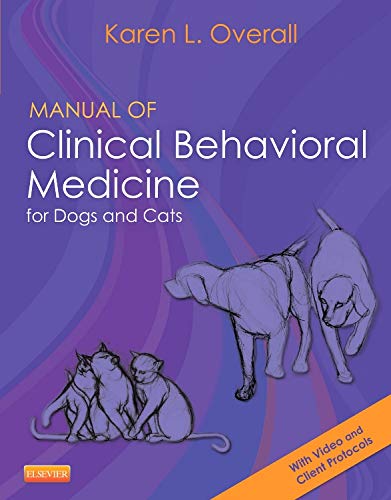 Reddit reviews Manual of Clinical Behavioral Medicine for Dogs and Cats
Reddit reviews Manual of Clinical Behavioral Medicine for Dogs and Cats
We found 3 Reddit comments about Manual of Clinical Behavioral Medicine for Dogs and Cats. Here are the top ones, ranked by their Reddit score.

Mosby
Talk to your vet, they might want to adjust the dosage or try a different medication. It might also just be a temporary thing, it almost always takes a while (4 to 6 weeks) for the positive effects from SSRIs to start showing up.
Some SSRI / Prozac info that might be interesting / helpful:
An article by the ASPCA, Behavioral Medications for Dogs says:
>>SSRIs are rarely effective the first day, and in fact can increase anxiety in some dogs before they begin to have therapeutic effects. Because SSRIs create changes in the brain, they must be taken for at least six weeks before they produce therapeutic results. Any decisions regarding the success of the treatment should be postponed until the dog has been on the medicine at least four months.
And Dr. Overall (a veterinary behaviorist) says in Manual of Clinical Behavioral Medicine for Dogs and Cats:
>>Treat for as long as it takes to begin to assess effects: ... 3 to 5 weeks minimum for SSRIs and more specific TCAs
>>Plus 2. Treat until “well” with either no signs associated with diagnosis or some low, consistent level of
signs: minimum of another 1 to 2 months
>>Plus 3. Treat for the amount of time it took to attain the level in (2) so that reliability of assessment is
reasonably assured: minimum of another 1 to 2 months
>>Total: Treat for a minimum of 4 to 6 months
2 very expensive books:
Canine and Feline Behavior and Training: A Complete Guide to Understanding our Two Best Friends
Manual of Clinical Behavioral Medicine for Dogs and Cats
Brief reviews of some other cat behavior books:
http://www.infopet.co.uk/pages/2023.html
Ah, yes. "The experts don't know what they're talking about, so trust me instead" argument.
All of your supposed takedowns of the veterinary community are easily refuted, but I'm not having this argument to convince you-- I'm having it for others who might be following this thread.
I'm fairly certain at this point everyone can see where you're coming from, so I feel pretty satisfied with where we are.
> I explained to you why your interpretation of L mech wolf study is wrong.
No, you didn't? And it's not relevant anyway, as this isn't very important in terms of the body of research that we currently rely on in veterinary behavior science.
For those not familiar, by the way, "balanced trainers" is this redneck idea that if you don't hit your dog sometimes, you're spoiling them. They would, of course, disagree with this exact phrasing, but it pretty well captures the mindset.
And for those following, as I mentioned earlier, it's pretty easy to find where expert consensus lies, as well as to see a broad range of citations supporting modern expert opinion. The citations are listed in 2 columns in small print, alphabetically; from "Olney" to "Song" covers 5 full pages. The person above me latched onto something he read somewhere and I have no idea why he's blown it out of proportion as if it matters. We don't study wolves to understand dogs, and why he insists some wolf study done in the 60's is the key to this argument is baffling to me. You can go to the google preview if you'd like to see it for free.
https://www.amazon.com/Manual-Clinical-Behavioral-Medicine-Dogs/dp/0323008909
But at this point you basically have two options: listen to the person who believes if the modern church would only listen to Jordan Peterson then less people would be leaving Christianity (that's an actual comment from his recent history) who has bought into every myth about animal health he can find, or look at the overwhelming amount of research and consensus informing expert opinion.
By the way, again to those following: no veterinarian is an expert in all of the things my opponent claims we try to be experts in. It would in fact be illegal for a veterinarian to claim they are. That's why we have veterinary specialists in dentistry, behavior, nutrition, surgery, internal medicine, and other fields. Your family vet is a general practitioner. I'm not asking you to trust me because I'm a veterinarian, I'm asking you to trust the community of veterinary behavior specialists because they're veterinary behavior specislists.